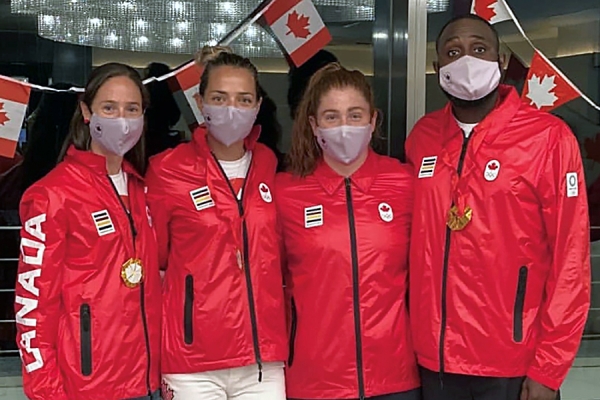 Kurt Downes (right) poses with Lancer Olympians Noelle Montcalm, Melissa Bishop-Nriagu, and Sarah Mitton in Tokyo.
Kurt Downes (right) poses with Lancer Olympians Noelle Montcalm, Melissa Bishop-Nriagu, and Sarah Mitton in Tokyo.
Kurt Downes (BA 2003, B.Ed 2005) always wanted to go to Japan, but the best part of his experience as an Olympic coach is sharing what he learned to benefit his students and athletes back home.
Head coach of the Border City Athletics Club, a teacher at St. James Catholic Elementary School, and a former assistant coach with Lancer track, Downes served as an assistant coach for Team Canada at the Tokyo Games.
“It was a terrific experience,” he says. “I love to travel, I love architecture and Japanese culture, so getting to go was pretty cool.”
Even with the social distancing protocols necessitated by the COVID-19 pandemic, he felt welcomed.
“The people were excited to show off their country. Everybody we met was incredible,” says Downes. “As a first-time Olympics coach, I genuinely was interested in it all.”
He says it was rewarding to see the world-class performances by Canada’s athletes, many of whom he had known previously. The team earned six medals on the track, including gold for sprinter Andre de Grasse and decathlete Damian Warner.
“I was ecstatic to be there, watching the culmination of their development,” Downes says.
Those are moments he has stored to use in his career going forward.
“I saw how important it was to go and bring back things for the kids in the classroom and the club,” he says. “Stories, pictures, relationships — anything that gives me a starting point with them, maybe hold their attention a little longer. It gives me a platform to do some good.”
He notes that students in his school, on Windsor’s west end, are often less advantaged.
“My class last year, you name it, we dealt with it: deaths of parents, mental health situations, a death from COVID. We routinely see everything you can name.”
Rather than shying away from the challenges, Downes welcomes the opportunity to make a difference, recalling the influences of educators in his own life.
“I have been very fortunate,” he says. “When I was getting into teaching, I had a lot of people influencing me.”
Downes, who is Black, cites mentorship from Black teachers in his elementary and secondary school, as well as in the UWindsor Faculty of Education, in particular professor Andrew Allen.
“Dr. Allen made teacher’s college seem like something I should be doing. I could work at schools where kids look like me,” he says. “One of the things I talked to Dr. Allen about is: these schools need you. That really resonated with me.”
He says Allen impressed upon him that young people need to be inspired by role models.
“I was able to see people that I could aspire to be,” Downes says. “Now it’s important for my students to see themselves reflected in all kinds of professionals and occupations. That’s true for girls, for boys, for kids from different backgrounds.”

